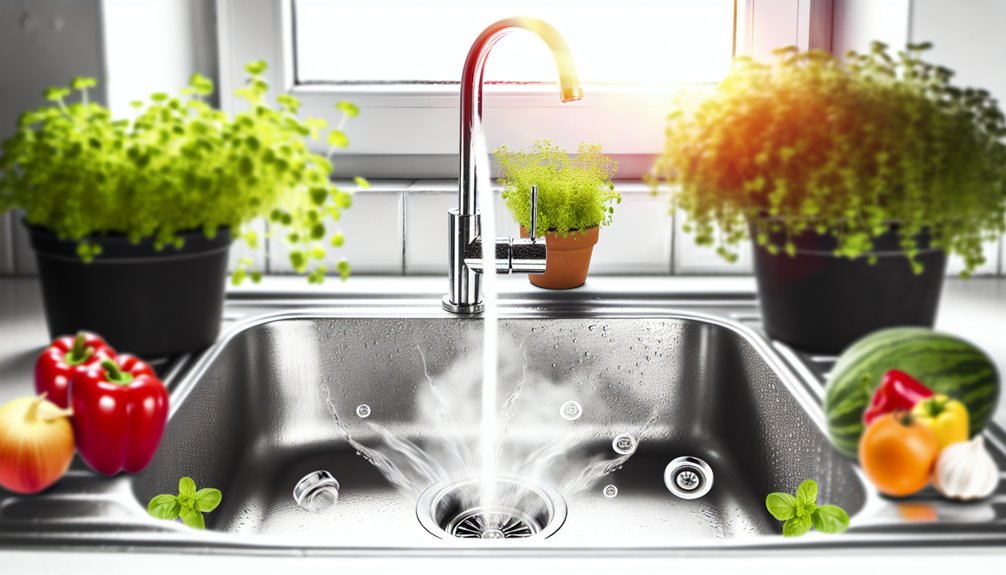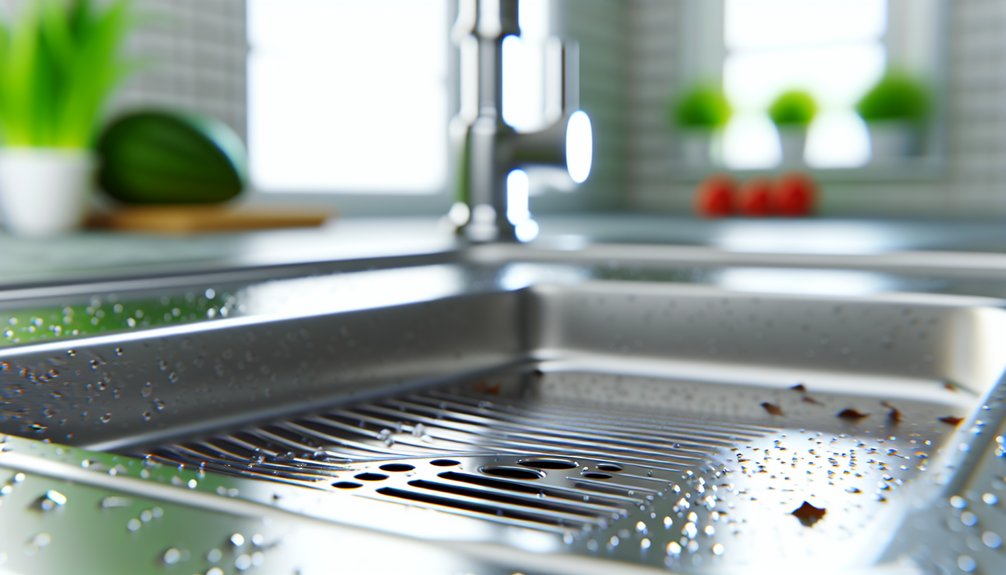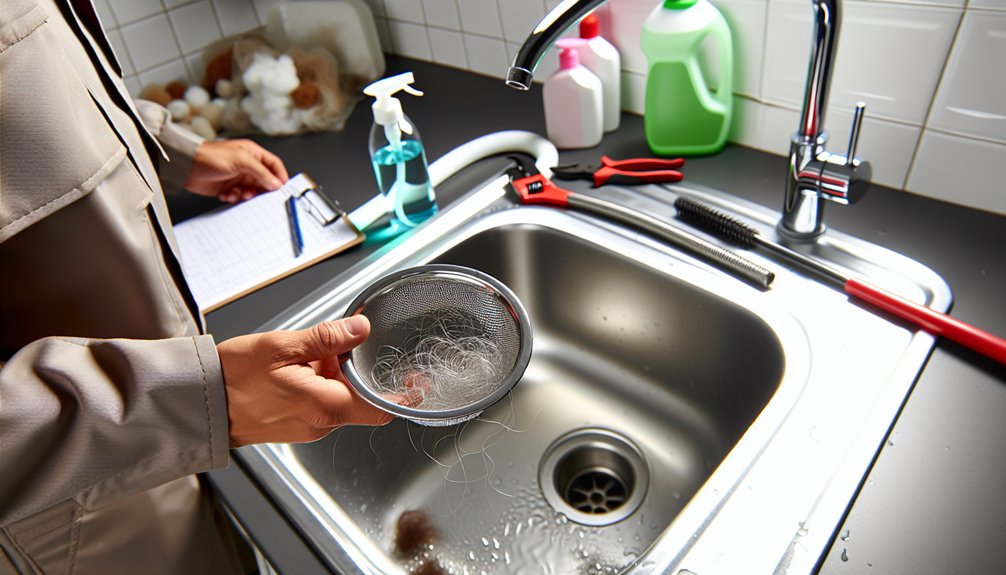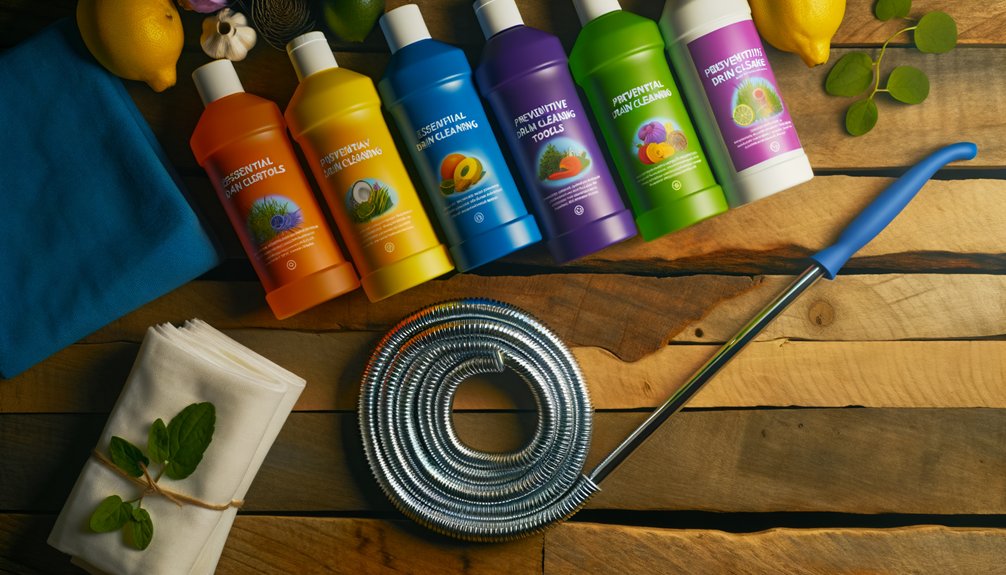To maintain a healthy plumbing system, homeowners should implement five key preventative drain cleaning tips. Regular hot water flushes dissolve grease, while a baking soda and vinegar mix reduces clogs. Installing drain screens effectively captures debris, and avoiding grease disposal in sinks prevents buildup. Finally, scheduling annual professional inspections helps detect hidden issues. Each of these methods contributes to efficient drain maintenance and system longevity, highlighting the importance of ongoing care for peak plumbing performance. More insights await.
Regular Hot Water Flushes

Regular hot water flushes serve as an effective preventative measure for maintaining clear drains in residential settings. Pouring boiling water down drains weekly aids in dissolving grease and soap scum buildup, considerably reducing the potential for clogs. This simple yet powerful cleaning tip enhances the plumbing system's efficiency, particularly in kitchen sinks where grease and food scraps commonly accumulate.
Adding a small amount of dish soap to the boiling water can improve results, ensuring a more thorough cleansing of slow drains. The versatility of hot water flushes applies to all types of drains, including those in bathrooms and laundry rooms, making it an essential aspect of drain maintenance. Consistent application of this technique not only prevents clogs but also minimizes unpleasant odors associated with stagnant buildup. By incorporating regular hot water flushes into home care routines, homeowners can liberate themselves from costly plumbing repairs.
Using Baking Soda and Vinegar
In addition to regular hot water flushes, using baking soda and vinegar presents an effective method for maintaining drain hygiene. This eco-friendly method involves mixing half a cup of baking soda with one cup of vinegar, creating a natural effervescent reaction that aids in breaking down organic material and preventing clogs. After allowing the mixture to fizz for approximately 15 minutes, rinsing with boiling water effectively clears any remaining debris, ensuring smooth drainage.
Regular application of baking soda and vinegar once a month can greatly reduce the occurrence of clogs caused by hair, soap scum, and grease in household drains. This combination not only assists in clearing minor clogs but also serves as a preventative measure for maintaining overall drain health. By adopting this simple yet powerful technique, homeowners can promote long-term drain maintenance and avoid the potential damage caused by harsh chemical drain cleaners.
Installing Drain Screens

Installing drain screens is a highly effective method for preventing clogs in household plumbing systems. By catching hair, food particles, and other debris, these screens considerably reduce the likelihood of blockages in sinks, showers, and tubs. Homeowners can choose from various types, including mesh screens and specialized hair catchers, tailored to different drain sizes and needs. This low-cost solution not only enhances the efficiency of the drain system but also minimizes the risk of expensive plumbing repairs caused by clogs. Regular maintenance is essential; homeowners must frequently empty and clean the screens to guarantee peak performance and prevent overflow. The straightforward installation process does not require professional assistance, making it an accessible maintenance step for all homeowners. By investing in drain screens, individuals can take proactive measures to maintain their plumbing systems and enhance the longevity of their home's drainage capabilities.
Avoiding Grease and Oils
Although many homeowners may not realize it, the improper disposal of grease and oils can lead to serious plumbing complications. When poured down the kitchen sink, grease solidifies and adheres to pipe walls, resulting in excessive buildup and ultimately clogged drains. To mitigate plumbing issues, homeowners should focus on avoiding grease by implementing proper disposal methods. For instance, allowing grease to solidify in a container before disposal prevents it from entering the drain. Additionally, wiping excess grease from dishes with a paper towel prior to washing can greatly reduce the amount of grease that enters the plumbing system. Composting certain kitchen scraps, such as vegetable peels, also limits organic matter in the drains. Regular drain maintenance, particularly in relation to food waste, is vital for preventing slow drainage and costly plumbing repairs. By adopting these practices, homeowners can maintain clear drains and enhance the longevity of their plumbing systems.
Regular Professional Inspections

Preventing plumbing issues extends beyond managing grease and oils; regular professional inspections play a pivotal role in maintaining a healthy drainage system. It is recommended that homeowners schedule these inspections at least once a year to identify and address potential issues before they escalate into costly repairs. Professionals utilize specialized tools to detect hidden problems, such as tree root invasions or pipe deterioration, which may not be visible to the untrained eye.
Routine inspections can considerably extend the lifespan of plumbing systems by ensuring that buildup and blockages are promptly addressed. For households with high water usage, such as large families or those with extensive landscaping, bi-annual inspections may be necessary. Engaging professional services for drain inspections also provides valuable maintenance advice tailored to specific plumbing needs, ensuring a proactive approach to home maintenance and fostering peace of mind for homeowners. Additionally, these inspections can help identify the need for sump pump services, which are crucial for managing excess water and preventing flooding in basements.
Frequently Asked Questions
What Is the Best Preventive Drain Maintenance?
The battle against drain disasters can feel like a war against an invisible enemy. Effective drain maintenance hinges on regular inspections and professional cleaning, ensuring ideal water flow and pipe protection. Clog prevention strategies, such as addressing grease buildup and foreign objects, are essential. Additionally, employing plumbing tips like using screens and enzymatic cleaners can combat unpleasant drain odors, fostering a healthier home environment. A proactive approach safeguards against costly plumbing emergencies.
Why Do Plumbers Say to Not Use Drano?
Plumbers advise against using Drano due to its harsh chemical composition, which can lead to pipe damage and increased plumbing safety risks. While marketed as a quick solution for drain cleaning, it often fails to address underlying clog prevention issues, ultimately resulting in repeated blockages. Additionally, the use of chemical drainers can harm the environment and beneficial bacteria in septic systems, prompting the recommendation of eco-friendly solutions and professional services as safer drain alternatives.
How Do I Keep My Home Drain Pipes Clean?
To maintain clean drain pipes, individuals can employ various drain cleaning methods as part of their routine plumbing inspections. Implementing plumbing maintenance tips, such as using eco-friendly solutions like enzymatic cleaners, enhances household drain care. Additionally, installing drain screens aids in preventing common drain clogs by capturing debris. Adopting preventive plumbing practices, including regular flushing and proper kitchen sink upkeep, guarantees bathroom drain hygiene and prolongs the life of drain cleaning tools.
Why Should You Never Use Baking Soda and Vinegar to Unclog a Drain?
Like a magician's illusion, baking soda and vinegar reactions promise quick fixes for clogs but often result in disappointment. These chemical reactions may create temporary fizzing, but they fail to address deeper plumbing issues, particularly stubborn blockages. Additionally, frequent use can corrode pipes, undermining plumbing maintenance. Instead of relying on household hacks, individuals should explore eco-friendly solutions and safe alternatives, prioritizing effective clog prevention strategies to guarantee long-term drainage health.


